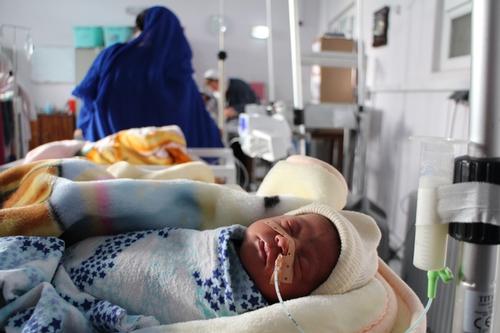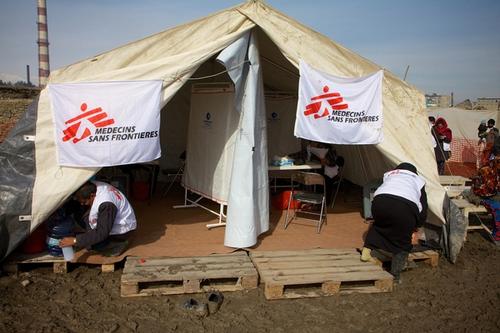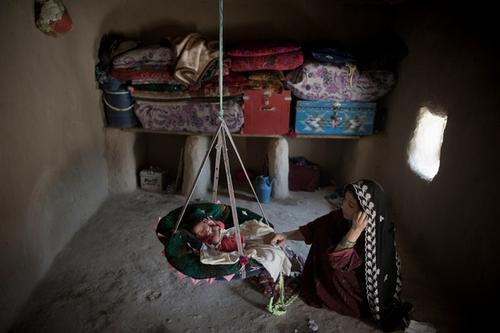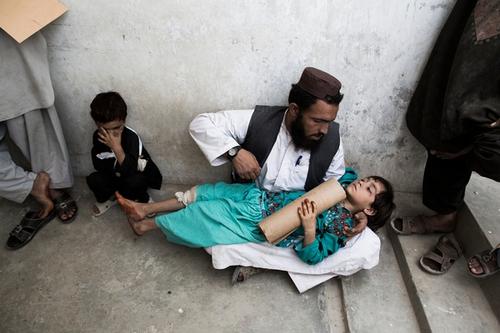Zukia*, 21 years old, lives in the Afghan province of Khost, which borders the Pakistani tribal areas. Her husband was killed in a bomb blast in Kabul when she was just one month pregnant, leaving her alone with her two children. She is now expecting her third child. “I am afraid to deliver at home. Some women in my village deliver at home, but if the placenta doesn’t come out, they are at risk of dying.”
Medical needs in Khost are enormous and the rate of maternal mortality is especially high. The region where Zukia lives only has a limited number of medical facilities. Near her home, there are small, private clinics, but she does not have much confidence in them. She gave birth to her first two children in a private clinic, located a number of hours away by road, where she had to pay between 4,000 and 5,000 Pakistani rupees for the delivery. For Zukia, now without her husband, this is a large sum of money, so this time she goes instead to the Médecins Sans Frontières (MSF) maternity hospital in Khost, which provides free care to women and newborns.

The city of Khost already has a public general hospital located outside the city, but access can be difficult due to distance and the cost of transport. Additionally, women from more traditional communities prefer not to go there because the surgical staff is male. In March 2012, MSF opened a facility in the downtown area with medical teams consisting exclusively of women.
Care for pregnant women and newborns
Today, Khost province is one of the regions most severely affected by the more than decade-long conflict. The roads that patients like Zukia have to take to reach a health facility are not safe. “I went to the MSF maternity hospital during the day because it was too dangerous to travel at night,” she explains. “In the area where I live, there is a lot of fighting. We hear shooting all night. We live near the Pakistani border. People are so poor that they have no choice but to travel for hours or days to reach a centre like this one where they can get good, free treatment in safety.” But sometimes the length of the trip leads to potentially fatal complications for the mother and child.
MSF therefore focuses on care for pregnant women and newborns, with surgical capacity for complicated deliveries. The objective is to raise the level of healthcare provided in the province, without duplicating existing services. The team now assists around 1000 deliveries per month in the 56-bed hospital, of which, nearly 20 per cent are complicated deliveries.
There is a significant need for high quality, impartial, humanitarian medical assistance in Afghanistan. In provinces like Khost, which are directly affected by the conflict, insecurity reduces the ability of humanitarian organisations to properly carry out their work.
Explosion inside hospital compound
The maternity hospital in Khost had its problems at first. In April 2012, barely six weeks after it opened, MSF had to suspend its activities after an explosion inside the compound itself. This explosion injured seven people and the hospital was closed for around eight months. MSF took time to reassess the situation and to strengthen its network to ensure greater support from the community and all the political and religious leaders in the area.
Since the reopening of the MSF maternity hospital in Khost on December 29, 2012, the teams have performed more than 5,500 deliveries. For Zukia, her labour has now begun. “I can feel the contractions. It is four days since they started, and it’s getting more and more difficult to bear. I asked the doctor and midwives for a Caesarean section because I find it harder and harder to bear the contractions. I am afraid of complications, but the doctor told me that I will have a normal delivery,” she says.
Some hours later, Zukia delivered her baby safely.
*Name has been changed to protect the patient’s privacy





